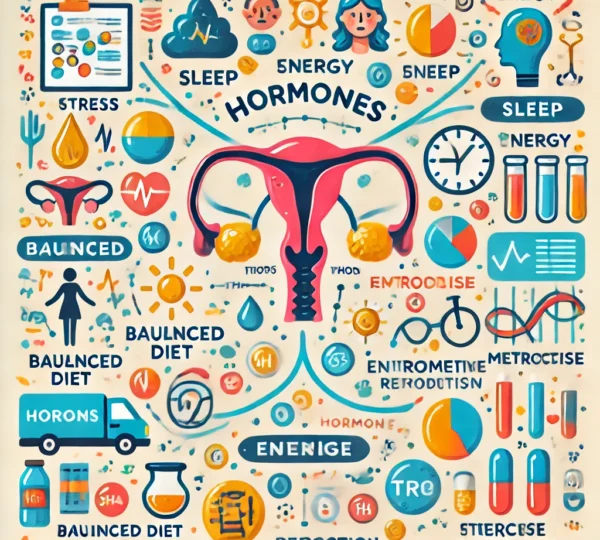Understanding Hormonal Imbalances: Causes, Symptoms, and Management
Introduction: Understanding Hormones
Hormones are the body’s chemical messengers, playing a key role in various functions, including mood, metabolism, and growth. In this blog, we’ll explore how hormonal imbalances can affect your health and provide practical steps for effective management of hormonal health.
What Are Hormones?
Hormones are produced by glands in our body, such as the pituitary gland, thyroid gland, and adrenal glands. They send signals to different organs and tissues, helping regulate processes such as:
- Growth: Hormones like growth hormone control physical development and child growth hormone levels.
- Metabolism: Insulin and glucagon help manage energy use from food, influencing metabolic hormone regulation.
- Reproduction: Hormones such as estrogen and testosterone are crucial for reproductive health and menstrual cycle regulation.
These tiny messengers influence everything from our energy levels to our emotional states.
What Causes Hormonal Imbalances?
Hormonal imbalances can occur for several reasons:
- Stress: High stress levels lead to cortisol production, disrupting other hormone levels and contributing to hormonal stress response.
- Poor Sleep: Inadequate sleep can lower the production of hormones like melatonin and growth hormone, affecting sleep hormone balance.
- Unhealthy Diet: Diets high in processed foods and sugars can negatively impact hormone levels, leading to weight gain and insulin resistance issues.
- Environmental Factors: Chemicals and pollutants, like endocrine disruptors, can interfere with hormone production, affecting endocrine health.
- Age and Genetics: Hormonal changes occur naturally with aging, and genetics can influence susceptibility to hormonal imbalance conditions.
Signs of Hormonal Imbalance
Hormonal imbalances can manifest in various ways, including:
- Mood Swings: Changes in hormone levels can lead to anxiety or depression, impacting emotional hormone balance.
- Weight Gain: An imbalance, particularly with insulin, can complicate maintaining a healthy weight, contributing to weight management challenges.
- Fatigue: Low energy levels may indicate hormonal issues, particularly thyroid imbalances affecting energy hormone levels.
- Reproductive Issues: Irregular menstrual cycles, fertility challenges, or low libido can signal hormonal problems, making menstrual health awareness crucial.
Recognizing these signs early is essential for maintaining good health. If you notice any symptoms, consult a healthcare professional.
How to Prevent and Manage Hormonal Imbalances
Proactive steps can support hormonal balance:
- Eat a Balanced Diet: Focus on whole foods like fruits, vegetables, lean proteins, and healthy fats. Incorporate omega-3-rich foods, such as fish and nuts, and avoid excessive sugar and processed foods to promote hormone-friendly nutrition.
- Exercise Regularly: Physical activity helps regulate hormones, improve mood, and maintain a healthy weight. Aim for at least 150 minutes of moderate exercise each week, making it a part of your healthy lifestyle changes.
- Manage Stress: Chronic stress can disrupt hormonal balance. Use techniques like meditation, yoga, or deep breathing to reduce stress levels. Engage in hobbies that relax you and take breaks when needed to enhance your stress hormone regulation.
- Get Enough Sleep: Aim for 7-9 hours of quality sleep each night. Good sleep hygiene, such as maintaining a consistent schedule and creating a restful environment, helps regulate hormones and ensures adequate sleep quality.
- Stay Hydrated: Drinking enough water is essential for overall health, including hormone function. Aim for at least 8 cups of water a day, adjusting based on your activity level and climate to support hormonal hydration balance.
The Importance of Regular Check-ups
Regular check-ups with your healthcare provider can help monitor your hormonal health. Discuss any symptoms or concerns. Blood tests can assess hormone levels and help identify imbalances early, ensuring preventive health measures are in place.
Conclusion: Take Control of Your Health
Understanding hormones and their effects on your body is essential for overall well-being. By knowing the causes of hormonal imbalances and how to manage them, you can make informed choices for a healthier life. Empower yourself with knowledge and take proactive steps to support hormonal balance, leading to improved health and vitality.
.



